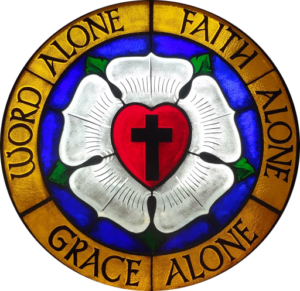Reformation Day
October 31
Today, we rejoice to celebrate the Festival of Reformation Day.
 On October 31, 1517, an Augustinian monk crossed a leaf-strewn courtyard to stand before the door of the Castle Church in Wittenberg, Saxony. There he posted a series of ninety-five statements, or theses, for debate among the theologians of the Church. Little did the poor monk know that he had just set in motion a series of events that would rock the Church in Europe to its core. The monk, of course, was Martin Luther, an Augustinian Eremite. Printers soon grabbed up his theses and had them translated into German and many other languages of Europe. Soon everyone knew who Martin Luther was and joined in the debate.
On October 31, 1517, an Augustinian monk crossed a leaf-strewn courtyard to stand before the door of the Castle Church in Wittenberg, Saxony. There he posted a series of ninety-five statements, or theses, for debate among the theologians of the Church. Little did the poor monk know that he had just set in motion a series of events that would rock the Church in Europe to its core. The monk, of course, was Martin Luther, an Augustinian Eremite. Printers soon grabbed up his theses and had them translated into German and many other languages of Europe. Soon everyone knew who Martin Luther was and joined in the debate.
The Roman curia, at the time quite hopelessly corrupt, had no interest in debate. They wanted the monk and his concerns to be silent and go away. He was interfering with the money that indulgences were intended to raise in Germany, money that funded finally the construction of the greatest Church Christendom had ever seen to honor the graves of Saints Peter and Paul in the city of Rome. But the monk wouldn’t go away or be silent.
He was judged a heretic by the Church officials and excommunicated by the pope. Luther was then summoned for trial before the secular authority, Emperor Charles V, at the Diet of Worms in 15321. Luther’s study of the Scriptures had utterly convinced him that he was not wrong to teach that salvation was by grace alone through faith in Christ alone, and he knew that this was, in fact, what the Church had anciently taught. He refused to recant his writings in the famous words: “I am bound by the Scriptures I have quoted and my conscience is captive to the Word of God. I cannot and will not retract anything. I cannot do otherwise, here I stand, may God help me, Amen.”
The Lutheran movement grew and spread like wildfire. Nine years after the monk stood all alone at Worms, numerous princes and representatives of the free cities stood before the same emperor at Augsburg on June 25, 1530. They proclaimed their faith in the words of the Augsburg Confession. They indicated they would rather suffer martyrdom than lose the precious Gospel of the sinner’s free justification, a doctrine which had brought such consolation to them and the people of their lands. A distinctly Lutheran Church was taking shape. The heritage received from the medieval catholic Church was purified in one territory after another according to the divine Word and in conformity with the saving Godpel.
Prayer: Almighty and gracious Lord, pour out Your Holy Spirit on Your faithful people. Keep us steadfast in Your grace and truth, protect and deliver us in times of temptation, defend us against all enemies, and grant to Your Church Your saving peace; through Jesus Christ, Your Son, our Lord, who lives and reigns with You and the Holy Spirit, one God, now and forever. Amen.
Weedon, William Celebrating the Saints 198-199
